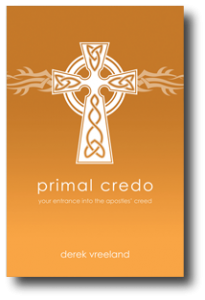 Today I’m joined by Winfield Bevins, author of Creed: Connect to the Basic Essentials of Historic Christian Faith
Today I’m joined by Winfield Bevins, author of Creed: Connect to the Basic Essentials of Historic Christian Faith, and Derek Vreeland, author of Primal Credo: Your Entrance into the Apostles’ Creed
. Both of these books deal with the use of the Apostle’s Creed in spiritual formation. I found these books to be helpful in different ways. Winfield focuses more on discipling a new believer, while Derek’s exposition intends to increase a believer’s knowledge of the basic truths of Christianity. I’ve invited Winfield and Derek to join me for a conversation about the usefulness of the Apostle’s Creed, the Ten Commandments, and the Lord’s Prayer in discipleship.
Trevin Wax: I thought about titling this blog post Why We Love The Creeds… By 3 Guys Who Shouldn’t. After all, we are young-ish and early-on in ministry. Yet all three of us have come to the conclusion that the Apostle’s Creed is a terrific place to begin the discipleship process. Ironically, none of us grew up in churches where creeds were recited or referenced. So I’m curious, how did you guys stumble upon this early confession, and what convinced you of its value to the church today?
Derek Vreeland: I first heard of the Apostles’ Creed while I was in college in the early 1990’s. I had grown up in a non-creedal church that taught us the evils of “secular” music. The alternative to the devil’s music was, of course, heavenly inspired, contemporary Christian music, which included the late, great Rich Mullins. I heard his song “Creed” during the “Christian-music-only” phase of my spiritual journey. Singing about the creed, Mullins says:
“I did not make it;
no it is making me.
It is the very truth of God
not the invention of any man.“
In my second seminary experience, I entered into a time of personal rediscovery of the doctrine of the Trinity. I had spent much of my faith journey drinking from the well of the charismatic renewal, and somehow I had lost sight of the Trinity in the brightness of a robust view of the Holy Spirit. Elevating the role of the Trinity helped me to redefine my faith not as “charismatic” or even “evangelical” (though I embrace both of these traditions) but as Trinitarian. So I was able to answer the question “What kind of Christian are you?” with the single adjective “Trinitarian.”
Trevin Wax: So you came to see the value of the creed through the back door of discovering the importance of Trinitarianism.
 Derek Vreeland: Yes. During this Trinitarian transition in my own heart and life, I found myself pastoring a church in rural South Georgia. As a congregation, we were hip, cool, casual, and nondenominational. I enjoyed that kind of vibe in church life and in the setting of Sunday morning worship, but I found that it lacked the depth and richness that come from connecting with Christian origins. We were self-consciously anti-traditional. The dark underbelly of this kind of approach to church life is it can lead to spiritual pride and elitism.
Derek Vreeland: Yes. During this Trinitarian transition in my own heart and life, I found myself pastoring a church in rural South Georgia. As a congregation, we were hip, cool, casual, and nondenominational. I enjoyed that kind of vibe in church life and in the setting of Sunday morning worship, but I found that it lacked the depth and richness that come from connecting with Christian origins. We were self-consciously anti-traditional. The dark underbelly of this kind of approach to church life is it can lead to spiritual pride and elitism.
I began thinking: Why would we want to reject the gifts of the historic, traditional church? They gave us the Bible that we are absolutely devoted to. Why not accept the creed too? The beauty of the creed is it allows us to connect with the “faith that was once for all delivered to the saints,” and it gives us the essentials of what it means to be a Christian believer.
Trevin Wax: What about you, Winfield?
Winfield Bevins: I grew up in a nominal Baptist home. Everyone knows that Baptists are not known for being creedal. So needless to say, I never heard of the creeds until I was in seminary. There I discovered that church history was a treasure chest of ancient tools and practices for discipleship. As I studied church history, I was introduced to the Apostles’ Creed and its significance for all believers regardless of their background or denominational affiliation.
I began to think to myself, If the creeds mattered to the majority of Christians throughout the history of the church, shouldn’t they matter to us as well? Slowly I became convinced of the importance of the Apostles’ Creed as a universal affirmation of the basic essentials of the Christian faith and of its doctrinal importance for today.
Another development in my understanding of the creed happened when I began using the Book of Common Prayer for my personal devotional life. The Book of Common Prayer contains the Daily Office, which is based on the ancient practice of prescribed daily times of prayer. These services are accompanied by daily Scripture readings (a reading from the Psalms, the Old Testament, the New Testament, and a Gospel reading). The Apostles’ Creed is included in the Daily Office and is meant to be recited and prayed during morning and evening prayers.
By following the Daily Office, I discovered the devotional nature of the creeds. Doctrine and devotion go hand in hand. Creeds are not just something that we confess as a statement of faith on Sunday but truths that transform us as we seek to live according to the gospel message in the real world. Therefore, I believe the primary value of the Apostles’ Creed for today is in both doctrine and devotion.
Derek Vreeland: Winfield, we also are beginning to use the Book of Common Prayer in the devotional life of our church. We pray the collect for the week in our services, and I am beginning to incorporate this into my own devotional life. You make a good point. The creed is both devotional and dialectical. There is a liturgical rhythm to the creed that gives it a sense of devotional beauty that works well in private devotions and corporate worship.
Trevin Wax: It’s interesting you bring up the Book of Common Prayer. During my last year in Romania, I became very dissatisfied with my own lack of passion in prayer. A friend gave me the Book of Common Prayer as a help and guide. The idea of praying a written prayer was foreign to me, but I found that the collects and the rhythm and structure reinvigorated my prayer life. My spontaneous prayers were then shaped and formed by this time-tested guide to prayer.
The way I look at it is like a child trying on his dad’s shoes. As a kid, you think, Will my feet ever fit into these shoes? That’s the way I felt when praying the words of Augustine, Cranmer, etc. These are spiritual giants whose footsteps I walk in. My heart isn’t where it needs to be, but as I pray written prayers, as I pray the psalms and the Lord’s Prayer, I sense that God is slowly shaping my heart so that I start wanting the things I’m praying for.
It sounds like for you guys there is a devotional aspect of this that is distinct from the discipleship process. Let’s talk about that for a moment. How has the Apostle’s Creed and the Lord’s Prayer affected you devotionally?
 Derek Vreeland: The devotional life is a part of discipleship in my view. As a follower of Jesus, we need to practice certain disciplines so we can put ourselves in places where we can be changed and transformed by the Spirit. I have made the Lord’s Prayer the very basis of my own prayer life.
Derek Vreeland: The devotional life is a part of discipleship in my view. As a follower of Jesus, we need to practice certain disciplines so we can put ourselves in places where we can be changed and transformed by the Spirit. I have made the Lord’s Prayer the very basis of my own prayer life.
I believe evangelicals have made the mistake of assuming Jesus never intended us to recite the prayer He gave. Jesus gave us both a pattern to pray and a prayer to pray when He said, “When you pray, say…” (Luke 11:2). I tried to pray on my own for years, praying spontaneous prayers, which for the most part were shallow and weak. I do pray spontaneous prayers, but my personal prayer life is built around the prayer Jesus gave us.
Praying the Lord’s Prayer keeps me focused on God and His kingdom, which makes the Lord’s Prayer a perfect companion to the Apostles’ Creed. One of the weaknesses of the creed is there is no reference to the kingdom of God, no reference to anything Jesus actually taught. The creed goes from the incarnation of Christ (conceived by the Holy Spirit, born of the Virgin Mary) to the passion of Christ (suffered under Pontius Pilate). So it is difficult to say that the creed contains all of the essentials of the faith without including the kingdom of God, which is central to all Jesus taught. Praying the Lord’s Prayer on a regular basis complements the creed with a regular request for God’s kingdom to come.
Winfield Bevins: I am not surprised that guys like us are beginning to discover and use the Book of Common Prayer. It offers a refreshing alternative to our ahistorical, postmodern, contemporary version of Christianity. It is not a substitute for personal or private prayer; rather, it is an aide that can help enhance and deepen our personal prayer life.
The Apostles’ Creed and the Lord’s Prayer help us rediscover the devotional aspect of discipleship. While discipleship is very personal and private, it is also communal. It is my belief that disciples are made in community, not isolation. Perhaps the reason why many churches struggle with making disciples is that they do not know how to live in community.
Like Derek’s church, we also pray the collect each Sunday. In addition, we also say the Lord’s Prayer together during the service. By doing this we are reminded of the corporate nature of our discipleship. In the Lord’s Prayer we pray, “Our Father,” “Give us,” “Forgive us,” and “Lead us.” We pray it personally, but we also pray it corporately together. It reminds us that we are not alone, that we are a part of a larger Christian family of men and women who have gone before us in the faith as well as with millions of believers living today.
Likewise, whenever we say the Apostles’ Creed, we are also uniting with Christians everywhere who are affirming the same essentials of the faith. It wasn’t invented yesterday, and there is something comforting and devotional about that, kind of like a warm cup of coffee in the morning. The Apostles’ Creed is a great gift to the church and belongs to all Christians everywhere.
 Derek Vreeland: The devotional life is a part of discipleship, but it is only one part. I agree that discipleship is communal and that the Lord’s Prayer, with all of its third-person pronouns, helps to underscore the communal nature of following Christ. This is another reason why the Lord’s Prayer is the perfect companion to the Apostles’ Creed. The creed is all in the first person – “I believe…” The Lord’s Prayer reminds us that there is a “we” behind the “I.”
Derek Vreeland: The devotional life is a part of discipleship, but it is only one part. I agree that discipleship is communal and that the Lord’s Prayer, with all of its third-person pronouns, helps to underscore the communal nature of following Christ. This is another reason why the Lord’s Prayer is the perfect companion to the Apostles’ Creed. The creed is all in the first person – “I believe…” The Lord’s Prayer reminds us that there is a “we” behind the “I.”
I also see the ecumenical value of the creed. We can become stunted in our spiritual growth if we only read and fellowship with Christians within our own tradition. Connecting with Christians of different traditions through conversation or through their writings stretches us and allows us to see our blind spots. We may not always agree, but what binds us together is our common confession of faith through the creed.
Trevin Wax: Thanks for this conversation, guys! May the prayer given to us by our Lord and the creed given to us by the early church aid our spiritual growth as the Spirit fashions us into the image of Christ.

















